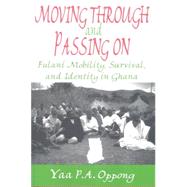Moving Through and Passing On: Fulani Mobility, Survival and Identity in Ghana
, by Oppong,Yaa P.A.- ISBN: 9780765801265 | 0765801264
- Cover: Hardcover
- Copyright: 5/31/2002
The Fulani are one of West Africa's most populous and geographically dispersed ethnic groups. Commonly thought of as a pastoral people, primarily engaged in cattle herding, Fulani peoples are in reality highly differentiated in livelihood and patterns of mobility. Despite having a long history of residence in Ghana, Fulani are considered "aliens" in the eyes of the state and "strangers" by the various ethnic groups among whom they reside. Among Fulani themselves, differences of place, circumstance, and experience have generated parallel ambiguities on matters of identity and survival. In Moving Through and Passing On, Yaa P.A. Oppong focuses on the Fulani of the Greater Accra region to offer the first detailed account of the lives of this transnational community in Ghana.Based on eighteen months of ethnographic fieldwork, Oppong develops detailed case studies and draws upon over two hundred in-depth life histories to explore issues of mobility, survival, and identity among this spacially dispersed and diverse group. Using perspectives and insights gained from oral life histories, private and public ceremonies, and ethnic associations, she examines the sites and circumstances in which people profess to be the "same" or "different" from one another. The markers of Fulani identity -- as recognized by Fulani and non-Fulani alike -- are examined. Oppong also explores the factors that allow them, as a distinct ethnic category, to maintain and perpetuate this identity and viability in Greater Accra. The metaphoric analogy of "construction sites" is employed to define the explicit and implicit events and recurring processes through which people conceive of themselves as Fulani. Theselocations and contexts of action include ethnic associations, public gatherings, and common rites of passage. The recurring processes include genealogical reckoning of kinship and endogamous marriage transactions, and the ways in w






